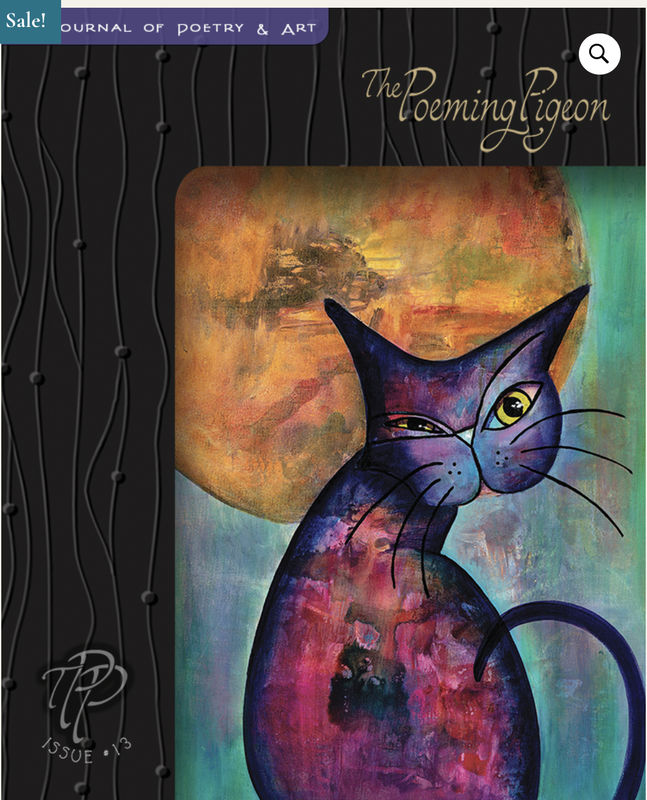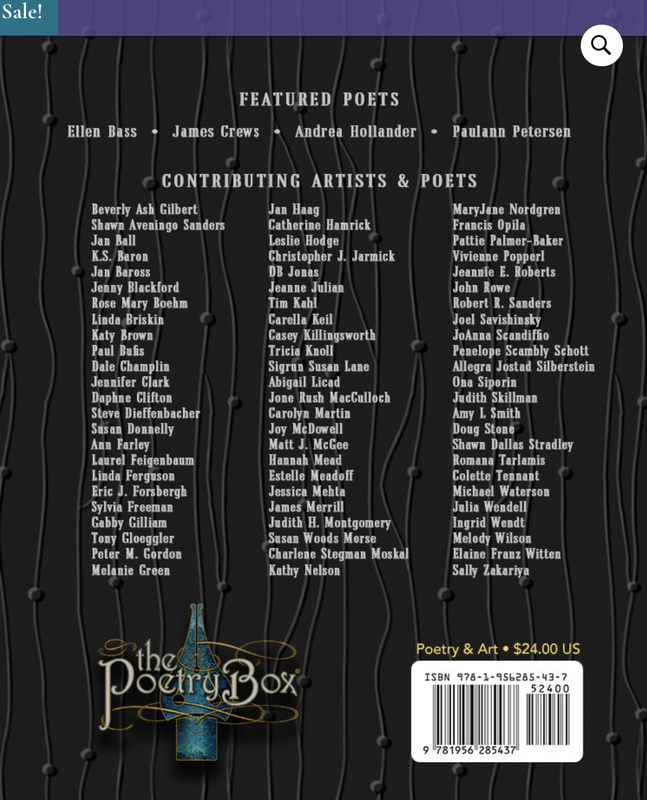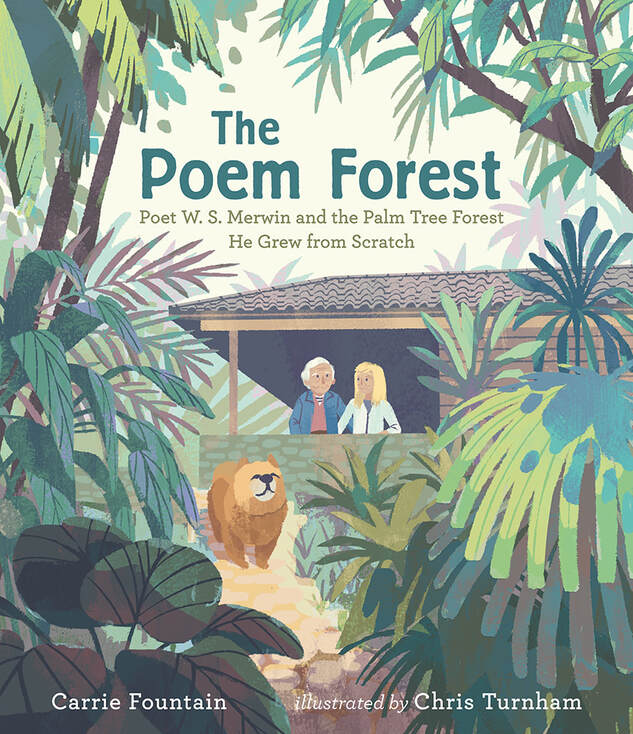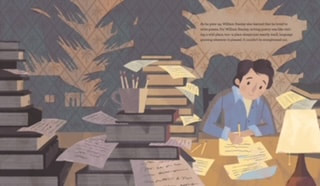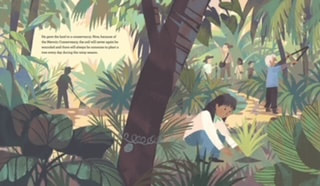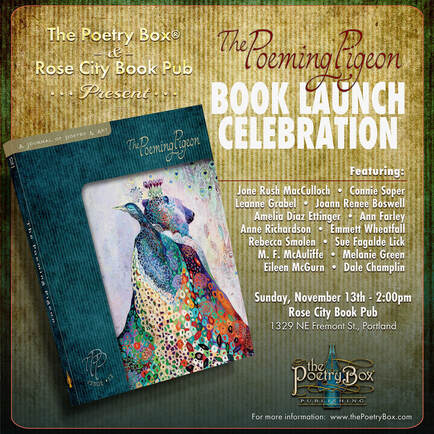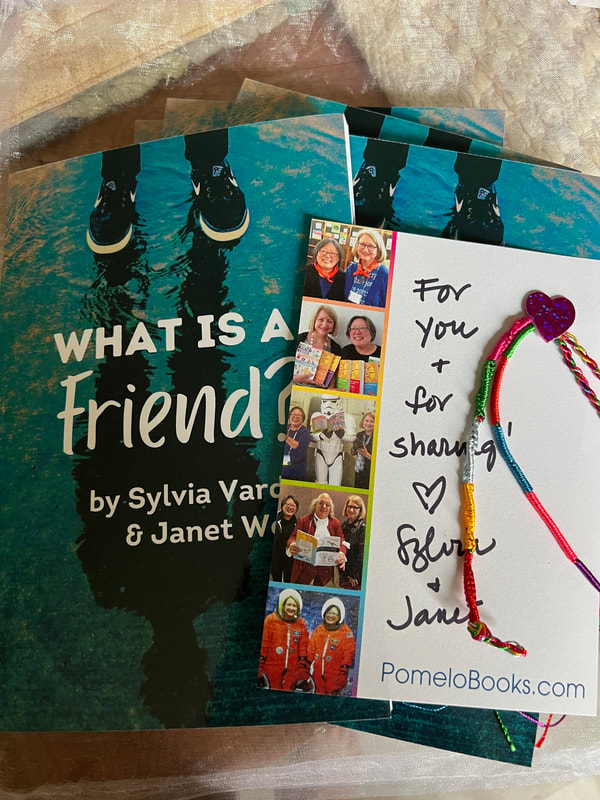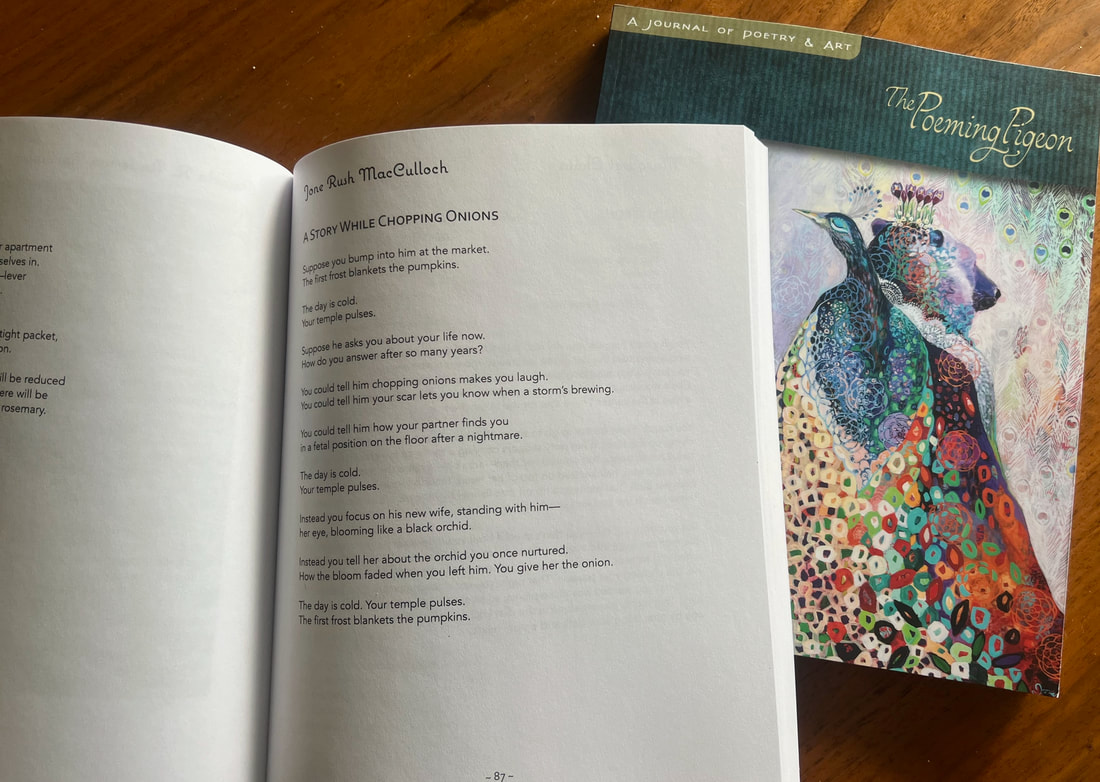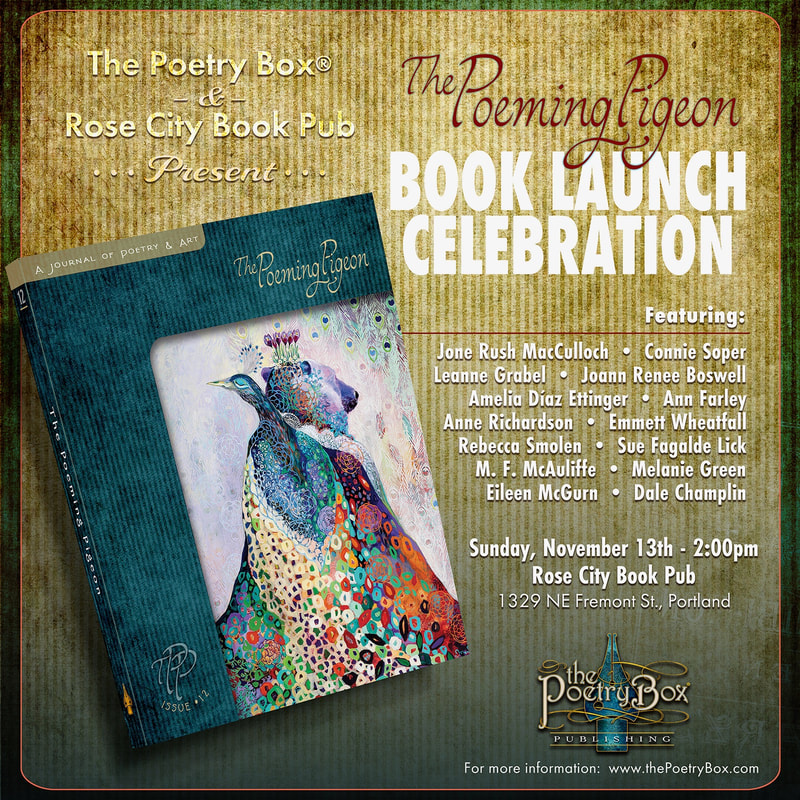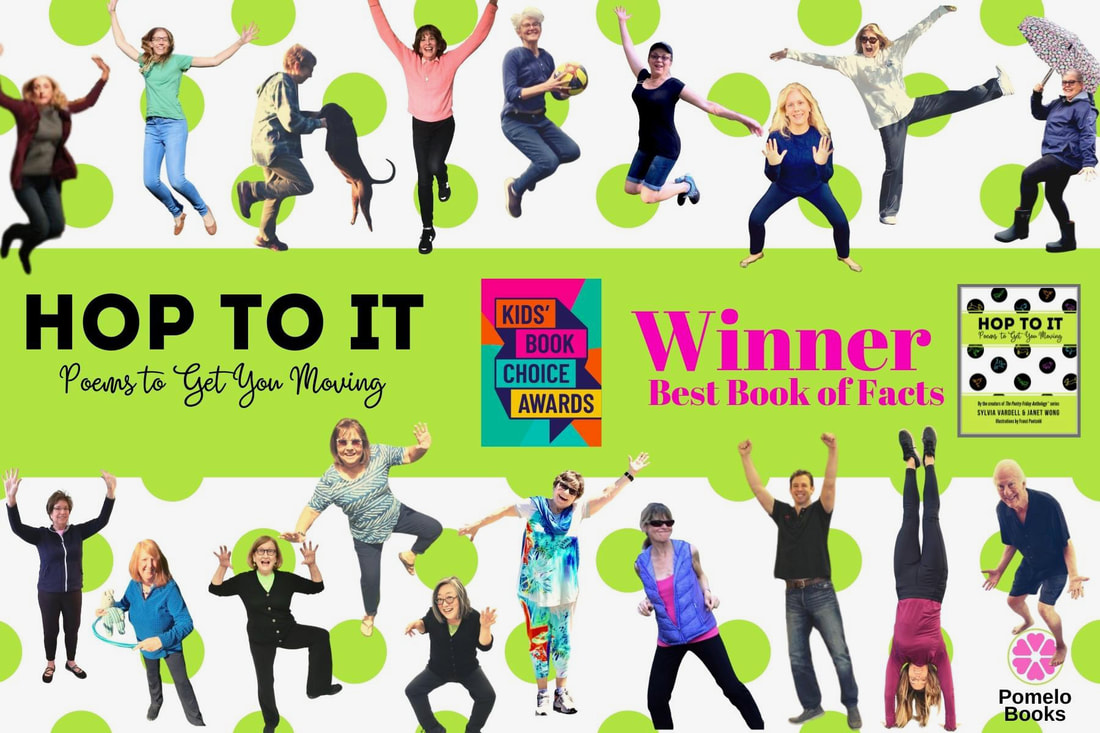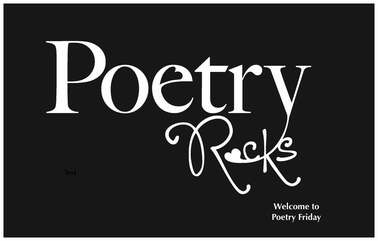 ©Graphic design by Amber Fleek ©Graphic design by Amber Fleek Tabatha at The Opposite of Indifference is hosting today. She tried something new this week: crème brûlée. Tomorrow I am heading to the Oregon State Fairground to drop off two photos for the Photography Show and two pieces of art for the Fine Art Show. I also hope to have my poetry ready to go as well but I can make another trip and bring it next week. The Poeming Pigeon: A Journal of Poetry & Art, Volume 13 Release Set for October 13, 2023I am honored to be in the company of poets James Crews and former Oregon Poet Laureate (and poetry mentor), Paulann Petersen in this issue. The theme is "Superstition".
My poem, "Life Threads", shared as an untitled draft to a poetry challenge response in May 2022, was accepted into this fabulous journal. Two photos were also accepted into the journal. Shawn Aveningo Sanders & Robert R. Sanders, editors, do an incredible job of producing a high quality magazine. Currently, The Poeming Pigeon, Issue, 13 is on preorder at the discounted price of $18.00 until September 15, 2023. If you would like to order a copy, head over to The Poeming Pigeon. They have a diverse selection of poetry titles. 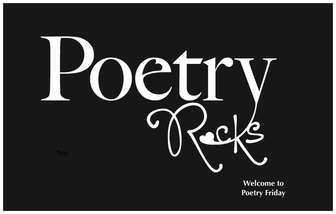 Graphic design by Amber Fleek Graphic design by Amber Fleek
Welcome to a cold and breezy Poetry Friday. I hope you have a warm fire or something warm to drink as you enter this special community. And thanks to Irene at Live Your Poem for hosting us all this Friday before Christmas Eve and Day.
May this weekend be filled with magic and mystery for all who celebrate. 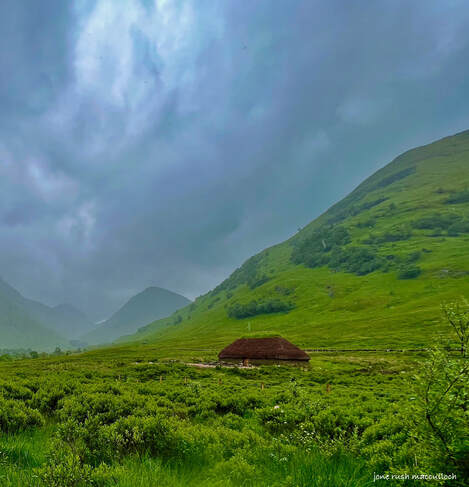
Besides collaborating with Linda Mitchell for Spark 53, I reached out to some new poetry friends. Fernanda Valentino shares a poem in What is a Friend edited by Sylvia Vardell and Janet Wong. She volunteered to write a response to this photo I took in Glencoe, Scotland. Fàilte Heavy clouds cascading Looming low, they skim And brush these emerald valleys With winter's thick, cold kiss. Laden with burdens The storm clouds linger, dense Their damp and dewy fingers Caress this desolate place. Melancholy mornings As sunlight struggles through Each day another battle For sunbeams, pale and new. What is this lonely, far-flung place? What does this small hut ponder? What secrets does it hide? What memories dwell inside? Let the clouds become nostalgic And the darkness dissipate To reveal the face of Spring Impart her warm embrace. This isolation's fleeting The time must surely come When the soothing voice of Spring Whispers “Welcome home”. ©Fernanda Valentino
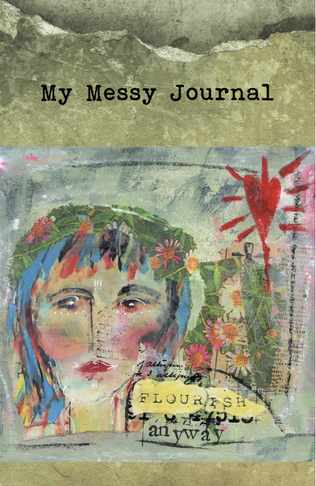
Are you thinking of a One Little Word for 2023? I have been. Last Saturday, I met Pamela Sue Johnson, a local mixed media artist at The Procrastinator's Market (on of my favorite event in December) It turns out she's offering an online class to create an art piece with your2023 word. I've signed up. I also bought a journal with this art as it has my word, flourish, from 2021.  Graphic design by Amber Fleek Graphic design by Amber Fleek
It's Poetry Friday and Michelle at Michelle Kogan is hosting us all. I always love when Michell hosts, her art is incredible and today she shares a very interesting article.
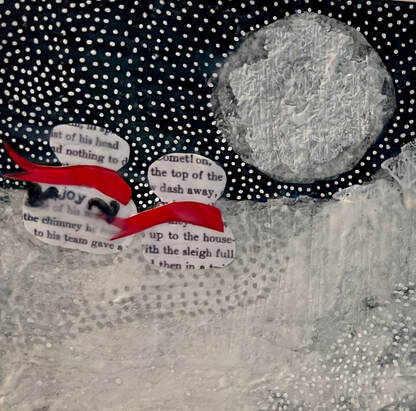
I've been working on some little art projects. I found some quotes about snow and winter for golden shovels.
Silent Salsa the moon could be breaking apart -Linda Pastan From Blizzard A starry, brittle night. The snow-people gaze at the moon. The snow-people wonder how they could dance a salsa on snowfields and be festive without music breaking the ice fields apart ©Jone Rush MacCulloch I think Linda Pastan is a poet whose work I want to read more. Still Time to Sign Up for 2023 New Postcards
Won't you join us? Sign up for the 2023 New Year Postcard Exchange. Send five, send ten or send to all. Did you know there are 23 days until 2022 ends? Woohoo! Let's celebrate the New Year with a New Year Postcard? In Japan, it’s called Nengajo, a Japanese custom of ushering in the new year.How It Works:

THIS SATURDAY!!
We have 12 poets reading and there will also be featured artwork from several artists in various slideshows. Here is the reading order. Sign up here to attend. https://thepoetrybox.com/live-12102022 I am excited to be reading.  Graphic by Amber Fleek Graphic by Amber Fleek
Welcome to Poetry Friday. It's December? Just wow! Catherine at Reading to the Core is hosting us today.
I am writing a small poem every day in December. December 1 rainy day birds on the feeder fireside nap ©jone rush macculloch December 2 hammers pound inside my mouth root canal © jone rush macculloch (had not only a root canal this week but microsurgery in the mouth and it's been raucous ) The Poeming Pigeon Book Launch Part II
We have 12 poets reading and there will also be featured artwork from several artists in various slideshows. Featured Poets: Amelia Diaz Ettinger • Emmett Wheatfall • Leanne Grabel • Anne Richardson • Rebecca Smolen • Eileen McGurn • Jone Rush MacCulloch • Sue Fagalde Lick • M.F. McAuliffe • Dale Champlin • Ann Farley • Carter McKenzie Here’s the link for registration: https://us06web.zoom.us/meeting/register/tZItce6grj0uGtM9iv1mC4LkrDY19wNhS5bB (Once registered, you will receive a link from Zoom. Then on the day of the show, simply use the link that was sent to you to join about 5 minutes before the show starts so we can start on time). There will be a “waiting room” and Shawn will start admitting people in order of arrival a few minutes before the show. She'll review “zoom etiquette” with the audience after I welcome everyone, so they know how the show will proceed and how to use the chat room / speaker view / how to “applaud” / muting microphones during the reading, etc. I will also formally introduce each of you before you read. https://thepoetrybox.com/live-12102022 I am excited to be reading. 2023 New Year Poetry Postcard Sign Ups
Won't you join us? Sign up for the 2023 New Year Postcard Exchange. Send five, send ten or send to all. Did you know there are 30 days until 2022 ends? Woohoo! Let's celebrate the New Year with a New Year Postcard? In Japan, it’s called Nengajo, a Japanese custom of ushering in the new year.How It Works:
On the November 17, 2022 post, I featured an interview with Rebecca Brock, author of Each Bearing Out. She graciously sent me two poems to share. One was shared during that post and today, I'm sharing her other poem.
Originally appeared online at Mom Egg Review, December 2020 Good Housekeeping She keeps trying to get her house in order pretending with the rest of them that the sun won’t melt the earth, that the seas won’t burn, that the land won’t disappear under water or ice or our own triggered destruction. She keeps going back to the dishes, to the meals, to washing the clothes, to worrying over the state of the carpet which is funny in a sad way if you knew the state of her house-- the way the windows leak, the way the doors have to be snugged closed, the way they blow open anyway, with the slightest wind, the cracks in the ceiling from settling or moisture or just poor craftsmanship. She still decorates for holidays, she still worries over the tidiness of things, the nutrition of meals, the state of the bathroom—of the toilet-- under assault by the misdirection and lack of attention of three males in one small house. She is like some mad woman straightening a frame during an earthquake, righting a vase after a hurricane took off the roof. She sees it is the season to behave so, to live beside, within madness-- to mother through it. It is despair pushed off to vacuum anyway, to make a decent meal, to require everyone to sit. She is hoping the children won’t notice or remember the windows, the carpets—the way the door won’t shut. She is desperate for their happiness for their solidity, for them to make it to some new place she never will. This poem really caught my eye. Plus happy news, Rebecca has recently found out she is a Pushcart Poetry Award nominee for two other poems The Poeming Pigeon Launch Party Via Zoom, December 10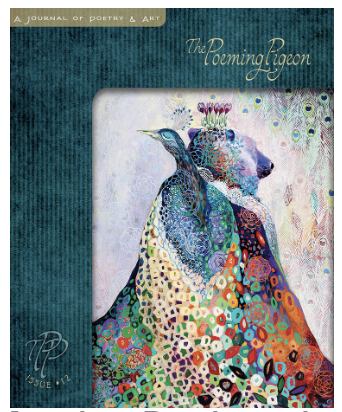
On November 12, The Poeming Pigeon held an online launch party for Issue 12. The video for that event is now posted and can be found HERE or below.
There was to be an in person event on November 13 but it needed to be rescheduled and moved to Zoom. While I was excited to present in person, I can now have my friends in other time zones attend via Zoom. You must register to attend. Hope to see you next month for our December 10th show for Part 2 of our launch of The Poeming Pigeon. You can register for event HERE 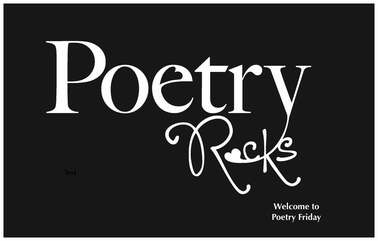 Graphic Design by Amber Fleek Graphic Design by Amber Fleek
Jama at Jama's Alphabet Soup has Poetry Friday hosting duties today. She's cooking up a delicious Thanksgiving parody poem. Plus she always has the most scrumptious food photos.
Today I have an interview with Rebecca Brock, author of an adult collection of poetry, Each Bearing Out. I "met" Rebecca in Laura Shovan's February Poetry Group on Facebook. She just published this wonderful collection about motherhood and the natural world. 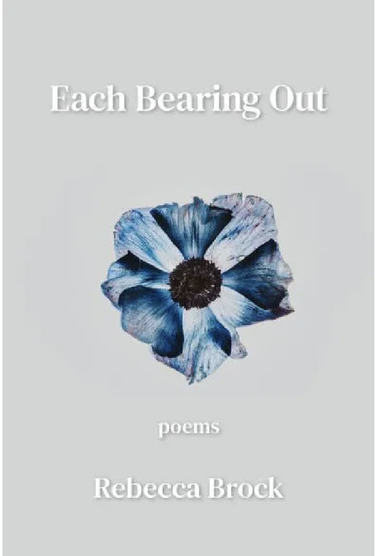
JRM: What was the process that led you to create Each Bearing out? Did you set out to write a
collection or did you write poems and then one day realized that there was a collection? I noticed that several poems found homes in journals first. RB:Thank you, Jone, for reaching out to me and sending me these questions. So much of this journey for me has been one of permission. I was finally writing again, after a long silence, and it took me a while to acknowledge to myself that I was writing poetry. I hadn’t written poetry since my undergraduate years—I studied fiction in graduate school and had only ever published in nonfiction. But I was writing a lot of poems I referenced as my “mom poems.” They felt very personal, like small snapshots caught from the blur. Eventually, I had so many that I began to think about making a small book. JRM: Have you always been interested in the natural world? I noticed you are originally from Idaho. How did growing up in Idaho play a part in your writing life? RB: I grew up in Boise, Idaho but moved away over twenty years ago. I’d always planned to go back, but life gets complicated and that distance between my original home and my home now informs a lot of my writing. I think my interest in the natural world has grown deeper through my experience of mothering. My kids were curious, input seeking creatures and seeing the world through their eyes is what’s really brought me back to noticing, and paying attention to the natural world. JRM: I was really struck by the poem “Good Housekeeping”. I struggle with keeping house, writing and being engaged with my family. Add the concerns about the environment, it really gets overwhelming. What is one event that led you to write that poem? RB: “Good Housekeeping” resonated with a lot of my friends who have been busy mothering through these last years. It was originally published with the tag line “America during Covid, during Trump.” There has been such a constant tumult these last several years—political, social, environmental. I would be trying to do the most ordinary thing like decorate for Halloween or vacuum and just feel this redundant dread, as if I were participating in a great pretending that lets us go on believing everything is fine. The question, for me, is still a constant—how do we mother these children toward a future we can’t even begin to fathom? JRM: Could you share with readers your process with how you decided the order of the poems? RB: Mostly instinct. I read them out loud, a lot, and paid particular attention to what would be the first and last poem. I printed them out and sorted them physically, by hand, all down the hallway in my basement. From there, I semi-sorted them chronologically according to my children’s ages in the poems, which left me with a burgeoning teenager by the book’s end. JRM: Were there poems that didn’t make the book? How did you decide which poems were in and which needed to be held for a different space? Are you planning a second book? RB: Yes! So many didn’t make it. Poems I felt were weaker or redundant…or too sentimental. I have so many poems about my kids, it is really how I’ve found a way to hold my own memory of these years. I also asked two friends, Liona Burnham and Ruth Lehrer, to read through a near-to-final draft and tell me their suggestions. It was easier to know what to leave out than what to leave in! I am working on my second book already—about landscape and distance, origin and loss. JRM: How did Laura Shovan’s February Poetry Month inspire you? RB: Laura Shovan’s February Poetry Month arrived in my life at just exactly the right time and inspired me entirely to keep writing and to trust in my own voice and the power of showing up to the page. I had been working in such solitude and suddenly I was in the (online) company of bright, gutsy, gracious poets willing to post such new writing every day—it made writing poetry both more magical and more ordinary. Again, I think I was seeking permission and the poets from February Poetry Month absolutely holler their permission at you every day you post. It’s quite a gift and I’m so grateful, every year I participate, for Laura and for the generosity of that space. JRM: How did “A Rock is a Rock is a Rock” come to be written? It made me feel the pain and sorrow when your child comes home from a bad day at school, juggling schedules, dinner, and empathy. RB: It’s an entirely true story and it’s about my boy who is all heart with arms and legs attached. He is constant and somedays I just can’t keep up. But he is also the kind of person who places you, in moments, in the absolute of now. Here's "Rock is a Rock is a Rock" Originally appeared online at Whale Road Review, Summer 2022 A Rock Is a Rock Is a Rock You got your feelings hurt at school, again, you tell me seriously that you feel a heartbeat thump thump thunking in your pet rock, you swear you can. I say it’s your own heartbeat, in your palm, hammering. I am straddling dinner and your brother’s baseball game-- and you try to explain how your best friend tried to make you throw the stupid thing away. I say I told you not to take it to school, I told you, over and over, a rock is a rock is a rock. I almost say, out loud, baby sometimes you’re just too much but your breaths are coming hard, your small chest heaves—love, there is nothing weak about you. I turn the stove off. You let me hug you, the pulse of you barely surface deep. When you let me hold him, Rocky is still warm. You believe in so many things, even me. JRM: What can you share with readers who are exploring writing chapbooks? RB: Calling it a chapbook necessarily focuses your theme and scope—and that helped me get my mind around the idea. I wasn’t trying to write a book…I was only working on a chapbook. I read a lot of other people’s chapbooks. And I looked up contest deadlines and used them as goalpost deadlines. I found poets whose work I admired, in literary journals I like, and I ordered their books, scoured their bios for ideas of where to submit. Submitting my poems before they were part of a book also provided me a sort of scaffolding—I knew certain poems had resonance and strength. Time to Think About 2023 New Year Postcard Exchange
Won't you join us? Sign up for the 2023 New Year Postcard Exchange. Send five, send ten or send to all. Did you know there are 44 days until 2022 ends? Woohoo! Let's celebrate the New Year with a New Year Postcard? In Japan, it’s called Nengajo, a Japanese custom of ushering in the new year.How It Works:
One More Announcement!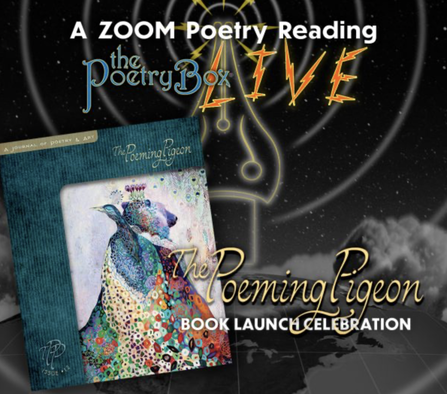
I have very exciting news.
It started as a disappointment, my in-person poetry reading for November 13 was canceled due to health concerns of one of the editors. However, they have decided to go with a Zoom Reading for Issue 12 of The Poeming Pigeon on Saturday, December 10 at 4:00 PST. I will be sending out the information as soon as I get a hold of it. I’m excited because now my online poetry friends will be able to tune in.  Today, Heidi at my juicy little universe is hosting Poetry Friday. Heidi has a n important PSA about voting, Plus a whimsical challenge for us. Did you know that Nov 14-20, 2022 is Folk Tale Week. Read about it at my juicy little universe. There are some wonderful prompts. Last Spring, I connected with Anne Irza-Leggat from Candlewick about interviewing poets. Carrie Fountain is the final of the four poets I interviewed. The Poem Forest is her first book for children but it's not her last one. 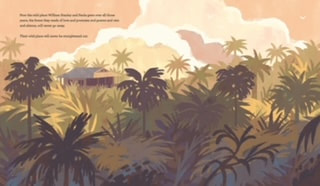 JRM: What drew you to the idea of writing about W. S. Merwin’s love of trees and ecology? CF: As a poet myself, I came to know W.S. Merwin first through his writing. When I came to learn of his moving to Maui and planting trees, it just struck me as a perfect story for kids. Merwin made his environmental activism a part of his everyday life. I think it can sometimes feel very overwhelming for kids (and adults!) to contemplate their actions against the large, swirling problem of, say, climate change. And I think Merwin's story offers inspiration: small, everyday commitments can make a difference. This is convenient, as our small, everyday lives are all that we have to work with. JRM: What was your process for writing this book? CF: Really, my desire for this story was to make a connection between Merwin's writing practice and his planting practice. A lifetime commitment to writing means a commitment to sitting down to do it everyday. I think some people imagine poets as people who walk around waiting for inspiration to strike and then jotting down whatever comes to them, and boom: a poem comes to you whole and finished. But that's not how it works! You can't plant a forest all at once. Like writing, it's something you attend to daily. I started writing this book with that idea in mind, and then read everything Merwin wrote about how he found his piece of land, how it was in very bad shape, and how over many years he went out daily to plant palm trees. There was something so meaningful to me in that commitment. And I thought it'd be meaningful to kids, too. JRM: I think one of the best parts about writing is doing research for a topic. What kind of research did you do for The Poem Forest? CF: Merwin wrote (very beautifully) about how he came to make the palm forest, and read everything I could find. Then I read his memoir Summer Doorways and learned more about his early life, and his longing to be in wild places, and his concerns about the environment and his deep sense of place. Rereading his poetry with the wider knowledge of his life, I was able to see how the line between the palms and the poems slowly begins to thin. There is so much meaning and metaphor taken from his experience in planting and living among the palms. JRM: What was the most surprising discovery you had in writing this book? CF: When Merwin first found the plot of land on which he'd plant his forest, it had been a failed pineapple plantation. I knew the basic story--the soil had been misused and needed repair. But I was surprised to learn just how much faith he'd had in that particular spot. People tried to talk him out of buying it. In the record books there was a note about the parcel that read "Nothing will grow here." Merwin wasn't a rich man with money to burn. So the fact that he allowed the land to speak to him, and that he took that chance and made that commitment was doubly inspiring to me. It makes one reflect on choices one has made in one's own life, and how it's best to truly look for room for challenge and faith and promise, rather than playing it safe. JRM: What is one of your favorite W. S. Merwin poems? CF: There are so many. I included his poem "Palm" at the end of the book--and I love that poem. He wrote many poems about the forest and about the palms. But I think my favorite W.S. Merwin poem is called "Thanks." It's a poem about our human pull toward offering gratitude, even in the face of great problems beyond our control. It ends: with nobody listening we are saying thank you thank you we are saying and waving dark though it is JRM: This is your first children’s book. What differences( if any )did you find writing for a target audience of children versus adults? CF: I think a lot of that is instinct, and remembering how smart and funny kids are. There are differences between these two audiences, but when you start focusing on the differences--what you can and can't say--you get into trouble. I like to imagine my own kids as my readers, and knowing how deep and philosophical they can be, I feel very comfortable going places that might feel very "adult" to others. So often I find children have much better access to the big, hairy, existential questions of life. JRM: Will there be more books for children in the future? What are your upcoming projects? CF: YES! I'm currently working on a book about work. I've always been fascinated by the idea of what people do all day. This book is a playful investigation of what work means, and what people actually do at their jobs. I want to celebrate the dignity of work and showcase jobs that don't always get attention in children's books. I think a lot of kids have trouble finding their own parents' jobs represented in books--and so I thought I'd write a book for them. Thank you, Carrie, for this great interview. I loved The Poem Forest so much. I am looking forward to your new book. If you would like to win a copy of The Poem Forest, leave a comment. a winner will be selected next week. Thanks to Anne Irza-Leggat from Candlewick for offering a copy to someone.
This past Tuesday, October 25, 2022, The Poeming Pigeon, 12th edition published. It has my poem, "A Story While Chopping Onions" in it. The journal is sumptuous! I am thrilled and honored to be among such wonderful writers and editor, Shawn Aveningo Sanders is an encouraging editor.
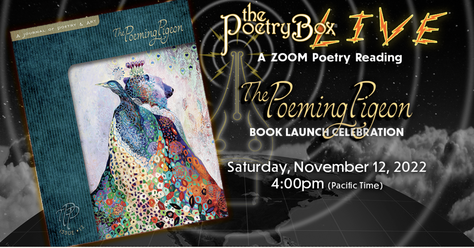
The weekend of November 12th and 13th will host two readings. The first one is via Zoom. While I am not listed to read, I am inviting you all to join us.
On Sunday, we will gather at Rose City Book Pub for an in-person reading. I am excited to be a part of this reading. I have a copy of this amazing journal to giveaway. Please comment and I will select a winner next Friday. Now let's share poetry! |
AuthorAll photos and poems in these blog posts are copyrighted to Jone Rush MacCulloch 2006- Present. Please do not copy, reprint or reproduce without written permission from me. Categories
All
Archives
July 2024
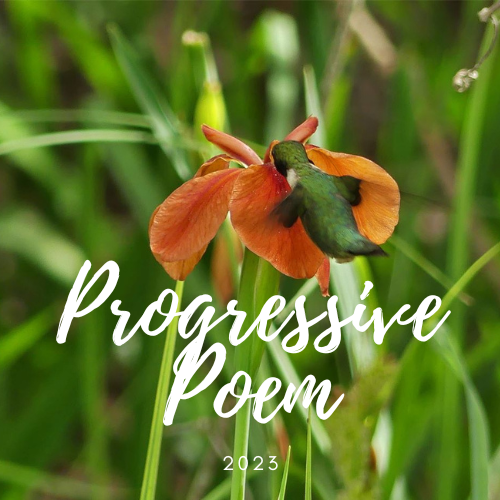
2023 Progressive Poem
April 1 Mary Lee Hahn, Another Year of Reading April 2 Heidi Mordhorst, My Juicy Little Universe April 3 Tabatha, The Opposite of Indifference April 4 Buffy Silverman April 5 Rose Cappelli, Imagine the Possibilities April 6 Donna Smith, Mainely Write April 7 Margaret Simon, Reflections on the Teche April 8 Leigh Anne, A Day in the Life April 9 Linda Mitchell, A Word Edgewise April 10 Denise Krebs, Dare to Care April 11 Emma Roller, Penguins and Poems April 12 Dave Roller, Leap Of Dave April 13 Irene Latham Live You Poem April 14 Janice Scully, Salt City Verse April 15 Jone Rush MacCulloch April 16 Linda Baie, TeacherDance April 17 Carol Varsalona, Beyond Literacy Link April 18 Marcie Atkins April 19 Carol Labuzzetta at The Apples in My Orchard April 20 Cathy Hutter, Poeturescapes April 21 Sarah Grace Tuttle, Sarah Grace Tuttle’s Blog, April 22 Marilyn Garcia April 23 Catherine, Reading to the Core April 24 Janet Fagal, hosted by Tabatha, The Opposite of Indifference April 25 Ruth, There is no Such Thing as a God-Forsaken Town April 26 Patricia J. Franz, Reverie April 27 Theresa Gaughan, Theresa’s Teaching Tidbits April 28 Karin Fisher-Golton, Still in Awe Blog April 29 Karen Eastlund, Karen’s Got a Blog April 30 Michelle Kogan Illustration, Painting, and Writing |
